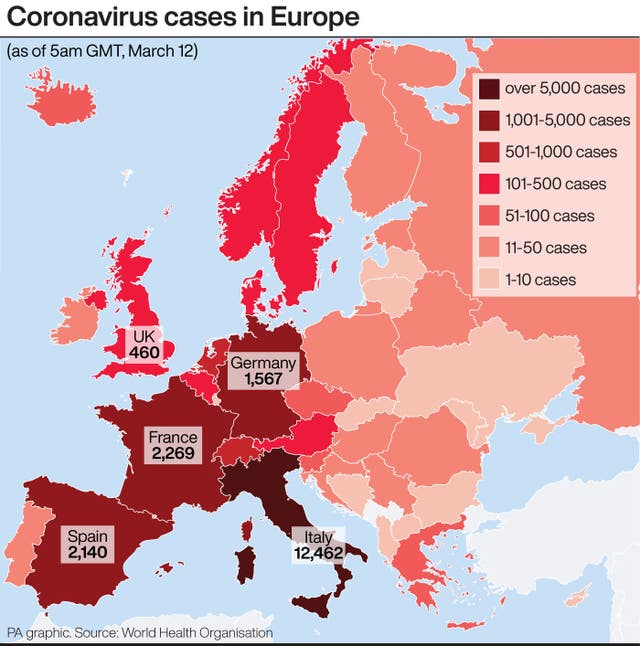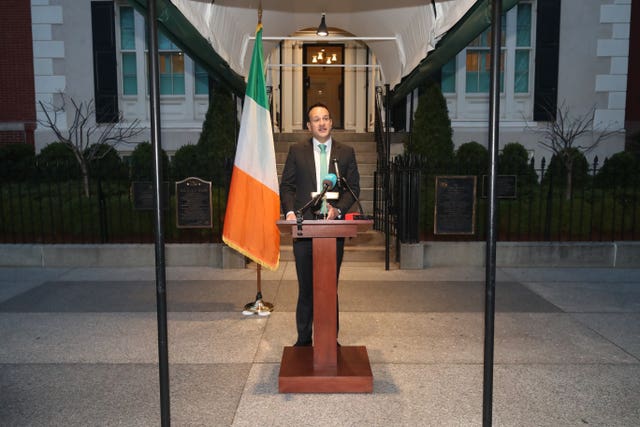
Ireland’s premier has defended ordering “drastic” measures against coronavirus.
Schools, colleges and childcare centres across the Republic are to close for two weeks in an unprecedented lockdown sparked by the outbreak of coronavirus.
Large indoor and outdoor gatherings are also to be cancelled, while the country’s Army is ready to respond to requests for emergency help.
Home working is encouraged and socialising should be limited, official advice said.
It adds that break times in workplaces must be staggered to reduce the infection’s spread and meetings should be held remotely.
Leo Varadkar said the measures were ordered following advice from public health experts and the European Centre for Disease Prevention and Control (ECDC).
“I appreciate there are other countries that maybe aren’t taking as drastic actions as us but we’d rather be safe than sorry when it comes to an issue of human health and human life of this scale,” he told the media towards the end of his visit to Washington DC.
Mr Varadkar was asked if the Irish Defence Forces are preparing to go on yellow alert and whether there were preparations for military quarantine zones.
“I can’t go into the detail of that but I can say that the Irish Defence Forces stand ready to aid the civil power if necessary,” he said.
“Both the chief of staff of the defence forces and the Garda Commissioner and their teams have been briefed about plans over the last couple of weeks so the gardai and defence forces stand ready to be available if needed.”
Government plans aim to ensure the food supply chain remains uninterrupted and shops are to stay open.
Restaurants, cafes and other businesses can continue trading but should look at ways to implement public health advice recommending social distancing.
Mr Varadkar said earlier: “We have not witnessed a pandemic of this nature in living memory. This is unchartered territory.”
Ireland recorded its first death of someone who tested positive for Covid-19 this week, involving an elderly woman being treated in a Dublin hospital.
Another 27 cases of Covid-19 were confirmed in the State on Thursday evening.
Twenty-two cases are associated with local transmission, two are associated with community transmission and three are associated with travel.
Three of the new cases are in intensive care units, bringing the total number of patients in ICUs to six.
There are now 70 confirmed cases in the Republic of Ireland.
A letter from Dr Tony Holohan, Ireland’s chief medical officer, to the Government said the number of cases detected had significantly increased in recent days.
It noted a number of intensive care unit hospital admissions.
The death, clusters of infection including at two hospitals and community transmission were other factors behind the advice.
The move was also in line with communication from the ECDC that cases outside known cases of transmission represented a strong signal for social distancing.
It said: “The early, decisive, rapid, coordinated and comprehensive implementation of closures and quarantines is likely to be more effective in slowing the spread of the virus than a delayed implementation.”
Cultural institutions such as museums and tourist sites will close in an effort to limit spread of the virus.
All indoor gatherings of more than 100 people and outdoor events involving more than 500 should be cancelled, the Irish Government said.
Arrangements are being made to ensure everyone entering Ireland through ports and airports is fully informed and self-isolates if they develop symptoms.
Mr Varadkar said: “Together we can slow the virus in its tracks and push it back.
“Acting together, as one nation, we can save many lives.”

He currently leads a caretaker Government following last month’s inconclusive election, and political meetings aimed at forming a new administration have been paused due to the emergency.
Mr Varadkar addressed the nation from Washington DC, where he is meeting US President Donald Trump, as he took swift action following updated advice from medics on Wednesday.
Health Minister Simon Harris confirmed the country has entered the delay phase of its response to the virus.
That means the infection is being transmitted between members of the community rather than limited to those who have been to Italy or other blighted regions or their close contacts.
The drastic steps aim to reduce the peak impact of the virus and slow its spread, relieving pressure on the health system.
Mr Varadkar said many more people in Ireland would fall ill with the infection.
And he added: “Unfortunately we must face the tragic reality that some people will die.

“The virus is all over the world, it will continue to spread but it can be slowed.”
He said the Government has a duty to protect those at-risk categories of citizens, such as older people and those with underlying health conditions.
“We said we would take the right actions at the right time and we have to move now to have the greatest impact,” he said.
School closures are among restrictions coming into place.
People have been urged to continue to go to work but, where possible, do so from home.
Public transport will continue to operate.
Mr Varadkar said: “Above all, we all need to look out for each other.
“Ireland is a great nation. And we are great people.
“We have experienced hardship and struggle before. We have overcome many trials in the past with our determination and our spirit.
“We will prevail.”


Comments: Our rules
We want our comments to be a lively and valuable part of our community - a place where readers can debate and engage with the most important local issues. The ability to comment on our stories is a privilege, not a right, however, and that privilege may be withdrawn if it is abused or misused.
Please report any comments that break our rules.
Read the rules here